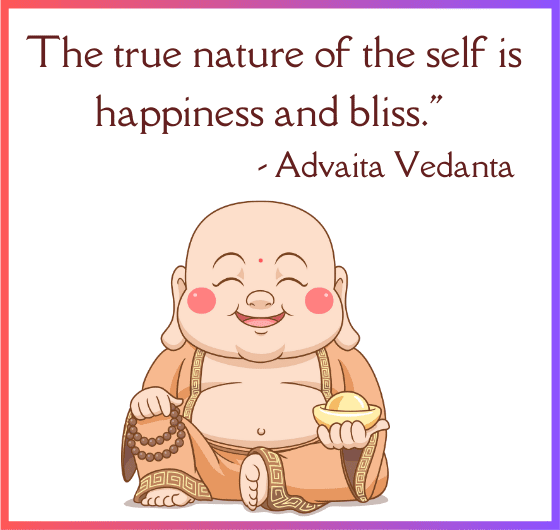Indian philosophy is one of the oldest and most complex philosophical systems in the world. With its emphasis on the interconnectedness of all things, Indian philosophy provides a unique perspective on the nature of reality and the human experience. One of the central themes of Indian philosophy is the pursuit of lasting happiness, which is seen as the ultimate goal of human life.
By exploring the teachings of Indian philosophy, we can unlock the secrets of lasting happiness and discover the true nature of ourselves and the universe around us.
“The wise see knowledge and action as one; they see truly” – Bhagavad Gita
At the heart of Indian philosophy is the concept of Dharma, which refers to the natural order of things and the individual’s place within that order.
Indian philosophy also teaches the importance of non-attachment and letting go of desires and attachments that lead to suffering.
In conclusion, Indian philosophy provides a unique perspective on the pursuit of happiness and the nature of reality. By exploring the teachings of Indian philosophy, we can unlock the secrets of lasting happiness and discover the true nature of ourselves and the universe around us

The connection between Vedanta philosophy and happiness in India
“The true nature of the self is happiness and bliss.” – Advaita Vedanta
Vedanta philosophy is an ancient Indian philosophical tradition that has been a major influence on Indian culture and spirituality. It is a school of thought that emphasizes self-realization and the attainment of happiness through spiritual practices. Here are some key points on the connection between Vedanta philosophy and happiness:
** Vedanta philosophy teaches that happiness is the natural state of the self and that we can experience it by realizing our true nature.
** It emphasizes the importance of developing a spiritual practice that includes meditation, self-reflection, and the study of spiritual texts.
** The practice of Vedanta philosophy can help individuals develop a deeper sense of purpose, meaning, and connection to the world around them.
** Vedanta philosophy encourages individuals to cultivate qualities such as compassion, generosity, and gratitude, which can promote lasting happiness and well-being.
** By understanding and practicing the teachings of Vedanta philosophy, individuals can experience a greater sense of inner peace, contentment, and joy in their lives.
Overall, Vedanta’s philosophy offers a rich and insightful perspective on the nature of happiness and how to cultivate it in our lives.
The Impact of the Bhagavad Gita on Happiness and Well-being in Indian Philosophy
“The soul is neither born, nor does it die.” – Bhagavad Gita
The Bhagavad Gita is an ancient Hindu text that has had a profound impact on Indian philosophy, spirituality, and culture. Its teachings emphasize the importance of self-realization, duty, and devotion to God. Here are some key points on how the Bhagavad Gita relates to lasting happiness and well-being:
** The Gita teaches that true happiness comes from achieving inner peace and realizing one’s true nature.
** It emphasizes the importance of maintaining equanimity in the face of life’s ups and downs, and not being attached to the results of one’s actions.
** The Gita also teaches that one’s duty or Dharma is an important component of a fulfilling life and that fulfilling one’s duty with devotion and detachment can lead to greater happiness.
** The Gita’s teachings on meditation and yoga as a means of achieving inner peace and self-realization have also had a significant impact on Indian philosophy and spirituality.
Overall, the Bhagavad Gita’s emphasis on self-realization, equanimity, duty, and devotion has provided a framework for individuals seeking happiness and well-being in Indian philosophy and spirituality.

The Role of Jainism in Promoting Lasting Happiness in Indian Philosophy
“The self is not something that one can see or hear or touch, but it is the one who sees and hears and touches.” – Brihadaranyaka Upanishad
Jainism, one of the oldest Indian philosophies, has a deep-rooted connection with the pursuit of happiness. Here are some ways in which Jainism promotes lasting happiness:
** Ahimsa or non-violence is the foundational principle of Jainism. It fosters compassion, empathy, and kindness, which are crucial for building positive relationships and finding inner peace.
** Jainism emphasizes the importance of mindfulness and self-control. By observing the principles of right conduct, individuals can train their minds to stay focused and centered, which helps in reducing stress and anxiety.
** The practice of detachment or aparigraha, as advocated by Jainism, helps individuals break free from the trappings of materialism, which often lead to dissatisfaction and misery.
** The concept of anekantavada or the acceptance of multiple viewpoints fosters tolerance and open-mindedness, which are essential for maintaining healthy relationships and finding happiness in diversity.
In conclusion, Jainism offers a holistic approach to happiness that is centered on non-violence, mindfulness, detachment, and acceptance.
The Significance of Karma yoga for Happiness in Indian Philosophy
Indian philosophy emphasizes the importance of karma yoga as a means to achieve happiness and fulfillment in life. Here are some key points about the significance of karma yoga for lasting happiness:
** Karma yoga involves performing one’s duties and actions with a selfless attitude, without expecting any personal gain or reward.
** By practicing karma yoga, individuals can overcome negative emotions such as greed, anger, and attachment, which can lead to inner peace and contentment.
** Karma yoga also helps individuals develop a sense of detachment from the outcomes of their actions, which can lead to greater equanimity and resilience in the face of challenges.
** Through the practice of karma yoga, individuals can also develop a deeper sense of purpose and meaning in their lives, as they work towards the greater good and the well-being of others.
** Ultimately, the practice of karma yoga can lead to a sense of unity with the world around us, and a greater sense of interconnectedness and harmony with all of creation.
“Everything that is in the universe is in you. Ask all from yourself” – Rumi
The Effect of Buddhist Philosophy on happiness levels in India
Buddhist philosophy has had a significant impact on happiness levels in India, with its teachings emphasizing inner peace and compassion. Here are some ways in which Buddhist philosophy promotes happiness in India:
** Mindfulness meditation practices are a key component of Buddhist philosophy, helping individuals cultivate awareness and control over their thoughts and emotions, leading to a greater sense of calm and happiness.
** The Buddhist belief in the impermanence of all things helps individuals detach themselves from negative emotions, leading to greater mental clarity and contentment.
** The concept of the Eightfold Path in Buddhism, which includes right mindfulness, right intention, and right action, provides a framework for individuals to live a meaningful and purposeful life, leading to greater happiness.
** The emphasis on compassion in Buddhist philosophy promotes a sense of connectedness with others, leading to greater happiness and fulfillment in relationships.
“As long as there is desire, there is no peace.” – Krishnamurti
The connection between Advaita philosophy and Lasting Happiness in Indian culture
Advaita philosophy is a prominent school of thought in Indian culture, emphasizing the unity of the individual soul with the divine. This philosophy has a deep connection with happiness and well-being. Here are some key points:
** Advaita philosophy teaches that happiness comes from within and is not dependent on external factors such as wealth or material possessions.
** According to Advaita, true happiness can be achieved by realizing one’s true nature as pure consciousness or the ultimate reality.
** The practice of self-inquiry and meditation is central to Advaita philosophy, which helps in the realization of one’s true nature and promotes inner peace and happiness.
** Advaita philosophy also emphasizes the importance of living a virtuous life and cultivating positive qualities such as compassion, kindness, and non-attachment, which contribute to overall well-being and happiness.
** By following the teachings of Advaita philosophy, individuals can experience a profound sense of fulfillment, inner peace, and lasting happiness.

The Importance of the Concept of Dharma for Lasting Happiness in Indian Philosophy
Indian philosophy is known for its rich spiritual teachings and values that promote happiness and well-being. One of the key concepts in Indian philosophy is Dharma, which refers to an individual’s duty or righteousness in life. Here are some points on the significance of Dharma in promoting happiness:
** Following Dharma brings a sense of purpose and meaning to life, which can lead to greater happiness and contentment.
** By doing what is right and fulfilling one’s duties, individuals can achieve a sense of inner peace and satisfaction.
** Dharma emphasizes the importance of selflessness and service to others, which can promote feelings of compassion and empathy, further contributing to long-lasting happiness.
** The practice of Dharma can help individuals make better decisions and choices, leading to a more fulfilling and joyful life.
** Living in alignment with Dharma can also lead to a sense of harmony and balance in one’s personal and professional life.
In summary, the concept of Dharma is integral to Indian philosophy and can play a significant role in promoting happiness and well-being.
“One who sees inaction in action, and action in inaction, is intelligent among men.” – Bhagavad Gita
The Relationship between Sufi Philosophy and Happiness in India
Sufi philosophy is a mystical Islamic tradition that has a profound influence on Indian culture, particularly in the realm of spirituality and happiness. Here are some of the ways in which Sufi philosophy promotes happiness in India:
** Sufi philosophy emphasizes the importance of introspection, self-awareness, and meditation, which can help individuals cultivate a sense of inner peace and joy.
** Sufi practices such as sama (whirling) and zikr (chanting) are believed to have a transformative effect on the mind and body, promoting feelings of ecstasy, love, and unity with the divine.
** Sufi poetry and music, such as Wawwali, are popular forms of artistic expression that inspire feelings of devotion and joy in those who participate in or listen to them.
** Sufi teachings emphasize the unity of all religions and the importance of compassion and love towards all beings, which can lead to a sense of connection and community, and foster positive relationships.
** Sufi philosophy promotes a deep trust in the divine, which can provide a sense of security and purpose in life, leading to greater happiness and fulfillment.
Sufism, a mystical Islamic tradition, has a strong presence in India and has influenced Indian philosophy and culture. Here are some key points about the relationship between Sufi philosophy and happiness in India:
** Sufi teachings emphasize the importance of spiritual love and connection with the divine for achieving true happiness.
** Sufi practices such as chanting, meditation, and dhikr (remembrance of God) are believed to bring peace and happiness to the practitioner.
** Sufi poetry and music are popular forms of expression in India and are often used to convey spiritual teachings and evoke feelings of joy and ecstasy.
** Sufi saints and their tombs are revered by many Indians, and visiting these sites is believed to bring blessings and spiritual benefits. Overall, Sufi philosophy and practices have played an important role in promoting happiness and spiritual well-being in India.
“The only true wisdom is in knowing you know nothing.” – Socrates

The Impact of Yoga Philosophy on Happiness and Well-being in India
Yoga philosophy has a deep connection with promoting happiness and well-being in Indian culture. The practice of yoga involves more than just physical exercises, it encompasses mental, emotional, and spiritual aspects as well. Here are some ways in which Yoga philosophy impacts lasting happiness and well-being in India:
** Yoga philosophy emphasizes the importance of being present and mindful in the moment, which can lead to reduced stress and increased happiness.
** Practicing yoga can help cultivate a positive mindset and a sense of inner peace.
** The practice of yoga also involves breath control, which can help calm the mind and promote relaxation.
** Yoga philosophy recognizes the interconnectedness of all things and promotes compassion and kindness towards others, leading to greater happiness and well-being for all.
** The practice of yoga can also help individuals connect with their inner selves and higher powers, leading to a sense of purpose and fulfillment.
Overall, yoga philosophy offers a holistic approach to promoting happiness and well-being in India.
The connection between Tantra philosophy and happiness in Indian culture
“The ultimate truth of tantra is that everything is pure and sacred, just as it is.” – Swami Rama
Tantra philosophy is an ancient Indian spiritual tradition that emphasizes the unity of the individual self and the cosmic consciousness. It has been associated with various practices that aim to awaken the dormant energies within the human body and mind. The teachings of Tantra philosophy emphasize the importance of embracing one’s desires and living a life that is both fulfilling and meaningful. Here are some ways in which Tantra philosophy promotes happiness:
** Tantra encourages individuals to embrace their sensuality and cultivate a healthy relationship with their bodies.
** It teaches individuals to view all experiences, both positive and negative, as opportunities for growth and transformation.
** Tantra emphasizes the importance of cultivating deep, meaningful connections with others and fostering a sense of community.
** Through practices like meditation and Breathwork, Tantra helps individuals develop a greater sense of self-awareness and connection to the present moment.
Overall, Tantra philosophy provides a unique perspective on the pursuit of happiness and offers individuals a path toward greater self-discovery and fulfillment.
Interesting facts about Tantra in Indian philosophy and happiness:
1.. Tantra is a branch of Indian philosophy that originated around the 5th-6th century CE and is centered around the idea of harnessing the power of energy within the body for spiritual growth and happiness.
2. Tantra teaches that the human body is a microcosm of the universe and that by tapping into the energy centers or chakras within the body, one can achieve a state of higher consciousness and lasting happiness.
3. Tantra practices often involve the use of mantras, Yantras, and mandalas to help focus the mind and connect with the divine energy within.
4. The practice of tantra can lead to increased feelings of joy, peace, and contentment as well as a deeper sense of connection to the universe and all beings.

Who is the Indian God of happiness?
Lord Ganesha is the Indian God of Happiness and Prosperity.
Introduction: In Hindu mythology, Lord Ganesha is revered as the embodiment of joy, happiness, and prosperity. As one of the most beloved and worshipped deities in India, he is known by several endearing names such as Vighnaharta (remover of obstacles) and Sukhakarta (bestower of happiness).
Let us delve into the significance of Lord Ganesha as the Indian God of Happiness.
Lord Ganesha, the son of Lord Shiva and Goddess Parvati, is depicted with an elephant head and a portly human body. His unique appearance signifies wisdom, intellect, and a gentle spirit.
As the Indian God of Happiness, Lord Ganesha holds a prominent place in Hindu religious practices and rituals.
Worship of Lord Ganesha is believed to bring auspiciousness, success, and overall well-being. Devotees seek his blessings before initiating any new endeavor, be it a business venture, an academic pursuit, or even a wedding.
Lord Ganesha is considered the remover of obstacles, and his grace is believed to pave the way for a smooth and prosperous journey.
During festivals like Ganesha Chaturthi, devotees across India celebrate the birth of Lord Ganesha with great enthusiasm.
Elaborate processions, devotional singing, and the installation of Ganesha idols mark these joyous occasions.
People offer prayers, perform aarti (a devotional ritual involving the waving of lamps), and share sweets and delicacies as a symbol of gratitude and devotion.
In conclusion, Lord Ganesha holds a significant position as the Indian God of Happiness. With his benevolent nature and ability to remove obstacles, he brings joy, prosperity, and auspiciousness into the lives of his devotees.
The worship of Lord Ganesha is a cherished tradition that reflects the belief in his divine power to bestow lasting happiness and fulfillment
Riddles make life better.
Here are five riddles related to Indian philosophy and lasting happiness:
1.. Riddle 1: I am the eternal truth, the ultimate reality, Seek me within, for lasting happiness is my key. Renounce the transient, embrace the eternal, In self-realization, find a state so vernal. What am I?
Answer: Atman (the true self)
2. Riddle 2: I am a river that flows in your mind, Unceasing and pure, a treasure to find. When your thoughts merge, like water with the sea, In lasting happiness, you shall forever be. What am I?
Answer: Nirvana
3. Riddle 3: I am a wheel that spins the cosmic play, Karma’s dance, as night follows day. With virtuous deeds and actions kind, In lasting happiness, you shall always find. What am I?
Answer: Samsara (the cycle of birth and death)
4. Riddle 4: I am the path that leads to peace, A practice ancient, never to cease. With mindfulness as your guiding light, In lasting happiness, you shall take flight. What am I?
Answer: Meditation
5. Riddle 5: I am a flame that burns so bright, Igniting wisdom, dispelling the night. With knowledge as your guiding fire, In lasting happiness, you shall aspire. What am I?
Answer: Jnana (knowledge or wisdom)
These riddles explore various concepts and ideas from Indian philosophy, offering a playful way to engage with the topic of lasting happiness. Enjoy finding their solutions yourself first!
Short Story on How Indian Philosophy Leads to Lasting Happiness
Once upon a time in a serene ashram nestled amidst the lush greenery of India, there lived a wise guru named Guru Dev. He was renowned for his deep understanding of Indian philosophy and the profound happiness it could bring to one’s life.
One day, a young and curious student named Ravi sought his guidance.
Ravi approached Guru Dev with a burning question, “Guru Dev, how can I find lasting happiness in this ever-changing world?”
Guru Dev smiled, his eyes sparkling with wisdom. He began to impart his teachings to Ravi, explaining how Indian philosophy holds the key to lasting happiness. He shared the quote, “Happiness is not the absence of problems, but the ability to deal with them joyfully.”
To illustrate the power of Indian philosophy, Guru Dev told Ravi the story of a humble farmer named Ram. Despite facing numerous challenges and setbacks, Ram remained content and joyful.
He explained that Ram’s happiness stemmed from embracing the concept of detachment, as taught by Indian philosophy. “Detachment doesn’t mean being indifferent,” Guru Dev emphasized. “It means freeing ourselves from the grip of desires and outcomes, finding inner peace regardless of external circumstances.”
As the days passed, Guru Dev introduced Ravi to various principles of Indian philosophy. He shared the quote, “In the present moment lies the treasure of happiness.” Guru Dev taught Ravi the practice of mindfulness, helping him understand the importance of living in the present and fully experiencing each moment.
To further emphasize the teachings, Guru Dev took Ravi on a nature walk. They marveled at the beauty of a blooming lotus flower in a pond. Guru Dev explained that the lotus grows amidst the muck and yet remains pristine and untouched. Similarly, Indian philosophy teaches us to cultivate resilience and inner strength amidst life’s challenges, leading to lasting happiness.
Guru Dev also emphasized the significance of self-realization. He shared the quote, “Know thyself, find everlasting bliss.” Through self-reflection, meditation, and introspection, Ravi began to uncover his true nature and understand the interconnectedness of all beings. He realized that genuine happiness lies in embracing compassion, kindness, and love for all living things.
As Ravi continued to learn from Guru Dev, he discovered the profound wisdom encapsulated in Indian philosophy. He understood that lasting happiness is not a destination, but a lifelong journey of self-discovery and spiritual growth.
In the end, Ravi expressed his gratitude to Guru Dev for illuminating the path to lasting happiness through the teachings of Indian philosophy. Guru Dev smiled warmly and said, “Remember, my dear student, happiness is within your reach.
Embrace the wisdom of Indian philosophy, practice its principles, and watch as lasting happiness unfolds in your life.”
With these words, Ravi embarked on his own journey towards lasting happiness, armed with the timeless teachings of Indian philosophy and the guidance of his beloved guru.
In conclusion, the story of Guru Dev and Ravi highlights how Indian philosophy leads to lasting happiness. It emphasizes the power of detachment, mindfulness, self-realization, and compassion in unlocking the profound joy that lies within each of us. As Guru Dev would say, “Embrace these teachings, my dear student, and may your life be filled with everlasting happiness.”


